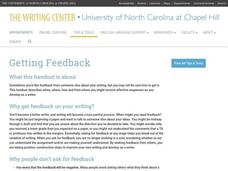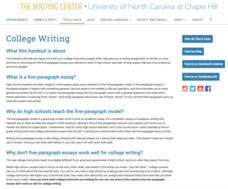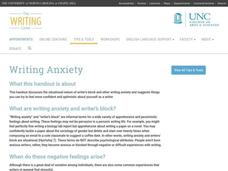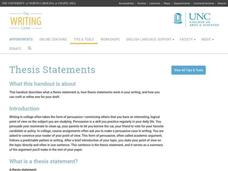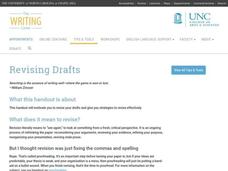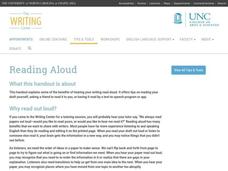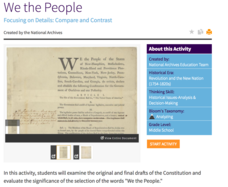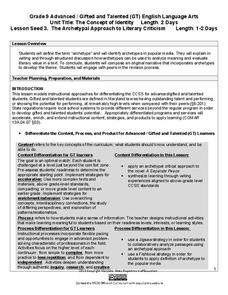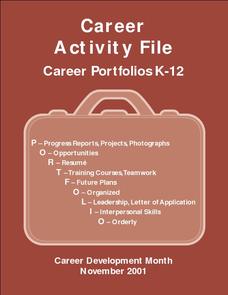University of North Carolina
Getting Feedback
As many writers know, you are your own worst editor. The 10th installment in the Writing the Paper series explains that getting feedback from others is crucial to the writing process. The handout highlights the best time to ask others to...
University of North Carolina
Conclusions
If you see phrases such as in conclusion or this is my paper about, you know you're about to read a poorly worded conclusion. A tip sheet, the fifth resource in a series of handouts to improve writing, helps scholars craft better...
University of North Carolina
College Writing
No matter how difficult high school writing may seem, college writing presents challenges of its own. The fourth in a series of 24 handouts from The Writing Center at UNC breaks down the expectations for college writing. Scholars learn...
University of North Carolina
Writing Anxiety
Oh, the dreaded writer's block! As part of a larger paper-writing series, an invaluable resource discusses obstacles and stresses writers face. Individuals learn to identify feelings associated with anxiety, as well as strategies for...
University of North Carolina
Thesis Statements
Phrases such as "This paper is going to be about" and "I am going to tell you about" do not make for effective thesis statements. A handout from the UNC Writing Center helps writers break from those phrases to craft effective thesis...
University of North Carolina
Revising Drafts
Don't simply proofread ... revise instead! Revising drafts is the topic of the 17th handout in UNC's Writing the Paper series of 24 lessons. Writers discover the importance of revision, as well as steps to follow during the process.
University of North Carolina
Reading Aloud
Warning: reading your paper aloud may cause bystanders to think you're talking to yourself. However, as the 14th installment of 24 in the Writing the Paper series from UNC explains, it is one of the best strategies for revision. Through...
CK-12 Foundation
Commonsense Composition
Any teacher with common sense should use the perfect resource to improve composition skills. Perfect for flipped lessons and station rotation, the text details information about genres of writing with guiding questions for readers....
The New York Times
I Don’t Think So: Writing Effective Counterarguments
When it comes to writing effective arguments, writers must do more than simply make a claim, counterarguments must be considered. Aspiring writers analyze counterarguments in editorials, and then learn how to write counterarguments in...
Broadway GPS
Kinky Boots—The New Musical: Official Show Guide
Drag queens in thigh-high shiny red leather boots! Welcome to Kinky Boots, the Tony Award-winning musical about a young man trying to save his family-owned shoe-making business. With an engaging story line and songs by Cyndi Lauper, the...
Library of Congress
Thomas Jefferson's Library: Making the Case for a National Library
The United States Library of Congress, the largest library in the world. But such was not always the case. The library was destroyed during the War of 1812. In a persuasive letter to Samuel H. Smith, Thomas Jefferson offered to sell his...
ReadWriteThink
Analyzing Famous Speeches as Arguments
A speaker, a message, an audience. After analyzing these elements in Queen Elizabeth's speech to the troops at Tilbury, groups analyze how other speakers use an awareness of events, and their audience to craft their arguments....
Walden Woods Project
19th Century Lessons for 21st Century Lives
The words of Henry David Thoreau on Civil Disobedience seem particularly relevant today, as are his writings and those of other transcendental thinkers who ask what it mean to live deliberately and what are the responsibilities of...
US National Archives
We the People Focusing on Details: Compare and Contrast
Even the most inspiring documents in American history had to go through a few drafts before they were ready for publication. Reinforce the importance of the writing process, as well as the collaborative nature of democracy, with an...
Turabian Teacher Collaborative
Parts of Argument II: Article Critique
Break down the parts of argumentative writing with a critical thinking activity. High schoolers read an article of your (or their choice), and use a graphic organizer to delineate the ways the author structures his or her arguments.
Maryland Department of Education
The Concept of Identity Lesson 3: The Archetypal Approach to Literary Criticism
As class members continue their study of approaches to literary criticism, readers examine the symbolism and archetypal patterns in John Knowles' A Separate Peace, and how these parallels are used to develop a theme in the story.
Maryland Department of Education
The Concept of Identity Lesson 2: The Historical/Biographical Approach
"How does our environment shape our identity?" After researching biographical information about John Knowles and considering how these experiences are reflected in A Separate Peace, class members consider the strengths and weaknesses of...
Olomana School
Mixtures and Solutions: Paper Chromatography Experiment
Why does some ink bleed through paper, and other ink doesn't? Practice some paper chromatography to separate the colors from a pen with an interactive experiment for middle and high schoolers. Learners use a variety of solutions to track...
Curated OER
Performance-Based Assessment Practice Test (Grade 11 ELA/Literacy)
Support your eleventh graders with a practice assessment for the Common Core tests. The practice test features a series of literary and informational passages and related multiple choice and essay questions. An online version is also...
Curated OER
Research Paper Project
Break down some of the most foundational components of writing a research paper, such as incorporating and formatting citations, creating a thesis statement, and using quotes effectively, into manageable tasks for your young writers.
Career Tech
Career Activity File
Pupils design career portfolios, which will demonstrate the skills and knowledge they have acquired during their schooling and personal endeavors, using the wide variety of worksheets and activities provided in this resource.
Speak Truth to Power
Jamie Nabozny: Bullying: Language, Literature and Life
Class members identify bullying in contemporary texts and role play how they might change those scenes to examples of anti-bullying. They then re-define their initial definitions of bullying and discuss what they would like to see as...
Curated OER
Constructing Narrative from the Migrant Experience in Literature
Excerpts from John Steinbeck's The Grapes of Wrath and from John Fante's Ask the Dust, as well as a variety of primary source documents provide the background for an examination of the migrant experience from 1920-1945.
We are Teachers
The Six Traits in Plain Language
If your rockin' writers use Six-Trait Writing, you'll definitely want to include these displays around your classroom throughout the year. Each trait (e.g. voice, word choice, organization, ideas, sentence fluency, conventions) is...


